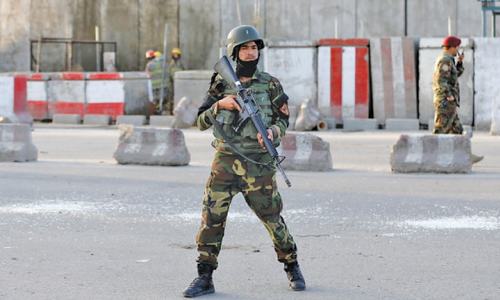More than 100 Afghan soldiers were killed and wounded in a coordinated Taliban attack on an army base in northern Afghanistan, the country's defence ministry said Saturday.
It is the latest in a string of deadly assaults against Afghan military sites, which underscores rising insecurity as Afghanistan braces for an intense spring fighting season.
The ministry did not give a breakdown of the casualties in the attack near Mazar-i-Sharif city Friday, which lasted several hours and targeted soldiers at a mosque and dining facility.
The US military has said that "more than 50" Afghan soldiers were killed in the assault, while an Afghan army source who was on the base at the time put the death toll as high as 150, with dozens more wounded.
Two of the attackers blew themselves up in the raid, which was claimed by the Taliban late Friday. All were dressed in Afghan army uniforms and arrived in military vehicles, the source said, speaking on condition of anonymity and adding that no civilians were killed.
The defence ministry said Afghan forces had killed all the attackers, without specifying how many there were. Earlier it had said one of the assailants had been detained.
The military source at the base said there were at least 10 attackers, adding that the soldiers were "young recruits who had come for training".
The toll could change, the defence ministry said in a statement, adding it would provide more information once an investigation was completed.
Afghan officials have been known to minimise casualty figures in some major attacks on military sites, such as in early March when gunmen disguised as doctors stormed the country's largest military hospital in Kabul, killing dozens.
Afghan officials put the death toll in that attack at 50, but security sources and survivors told AFP more than 100 were killed in the brazen and savage assault.
Military targets
General John Nicholson, the top US commander in Afghanistan, praised Afghan commandos for bringing the "atrocity to an end".
Afghan security forces, beset by killings and desertions, have been struggling to beat back insurgents since US-led NATO troops ended their combat mission in December 2014.
According to US watchdog SIGAR, casualties among Afghan security forces soared by 35 percent in 2016, with 6,800 soldiers and police killed.
The attack on the Kabul hospital in March came a week after 16 people were killed in simultaneous Taliban suicide assaults on two security compounds in the capital.
More than a third of Afghanistan is outside government control and many regions are fiercely contested by various insurgent groups, as Kabul's repeated bids to launch peace negotiations with the Taliban have failed.
Nicholson in February told the US Senate Armed Services Committee in Washington that he needed "a few thousand" more troops to help train and assist the Afghan forces.
The US has around 8,400 troops in the country with about another 5,000 from NATO allies assisting a much larger Afghan force in the war against the Taliban and other Islamist militants.
Earlier this month the US military dropped its largest non-nuclear bomb on ISIS hideouts in eastern Afghanistan, killing nearly a hundred militants.
The attack triggered global shockwaves, with some condemning the use of Afghanistan as what they called a testing ground for the weapon, and against a militant group that is not considered as big a threat as the Taliban.














































